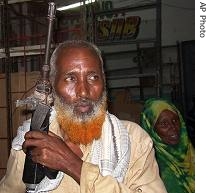2007年VOA标准英语-Somali Clan Opposes Disarmament Plan(在线收听)
Nairobi
12 March 2007
In the Somali capital, Mogadishu, elders of the locally-dominant Hawiye clan tell VOA that the interim government's plan to disarm civilians there by force will only ignite clan warfare and bring more instability. VOA Correspondent Alisha Ryu has more from our East Africa Bureau in Nairobi.

An old Somali man, holds his gun in Bakhara market in Mogadishu to defend his family from looters (File photo)
Struggling to assert control in the violence-wracked capital, the Somali transitional government announced on Sunday that its troops will soon begin conducting a massive, house-to-house search for weapons throughout Mogadishu.
Deputy Defense Minister Salad Ali Jelle says it is the intention of the government to disarm all civilians and bring security to the capital within 30 days.
In a telephone interview with VOA, the leaders of the dominant Hawiye clan in Mogadishu voiced strong objections to the disarmament plan.
Clan elder Abdulkadir Haji Muse says the biggest concern is who will be doing the disarming. He says most of the interim government troops patrolling the city are not from Mogadishu, but from the semi-autonomous region of Puntland. Moreover, the soldiers are members of Hawiye clan's chief rival, the Darod.
Puntland is the home of interim President Abdullahi Yusuf, who is a Darod. Muse says a move to disarm Mogadishu residents by force would be viewed by many people not as an effort by President Yusuf to bring security, but a move to marginalize and disenfranchise the Hawiye.
The clan elder says he and many others are convinced that the disarmament plan is a Darod attempt to politically and militarily weaken the Hawiye. Muse says his clan, which dominated the ousted Islamic Courts Union, will never accept government orders to disarm.
Somalia's multi-clan, U.N.-backed interim government tried to disarm civilians in Mogadishu two months ago, but postponed the process after hundreds of angry people rioted in the city.
Government officials say they will not back down this time because disarmament is the only way African peacekeepers can safely take control of the city's security.
The peacekeepers are to replace thousands of Ethiopian troops, whose military support of the interim government was crucial in driving out the Islamists in late December.
But many Somalis in the city view the Ethiopians as an invading force and the government they are protecting has been unable to gain popular support. Since January, both government and Ethiopian troops have come under near-daily attack from insurgents, who are believed to be radical Islamists, operating in cooperation with some disgruntled Hawiye factional militias.
About 1,000 troops from Uganda are already in Mogadishu as the vanguard of a planned eight-thousand member African Union peacekeeping mission to Somalia.
But another Hawiye clan leader, Khalid Hussein Abdi, tells VOA that their presence is not welcome.
Abdi says he believes the peacekeepers will do nothing but support militias from Puntland and Darod clan members, who are planning to subjugate the Hawiye.
Violence against the Ugandan peacekeepers began as soon as they arrived in Mogadishu last Tuesday, when they were greeted with a mortar barrage near the airport. The following day, insurgents ambushed a convoy of peacekeepers and on Friday, a cargo plane, carrying equipment and several Ugandan soldiers, landed at the Mogadishu airport in flames.
The Ugandan military said the plane had experienced mechanical problems and caught fire. But VOA has learned from reliable sources that the plane was hit by at least one rocket-propelled grenade fired from the ground.